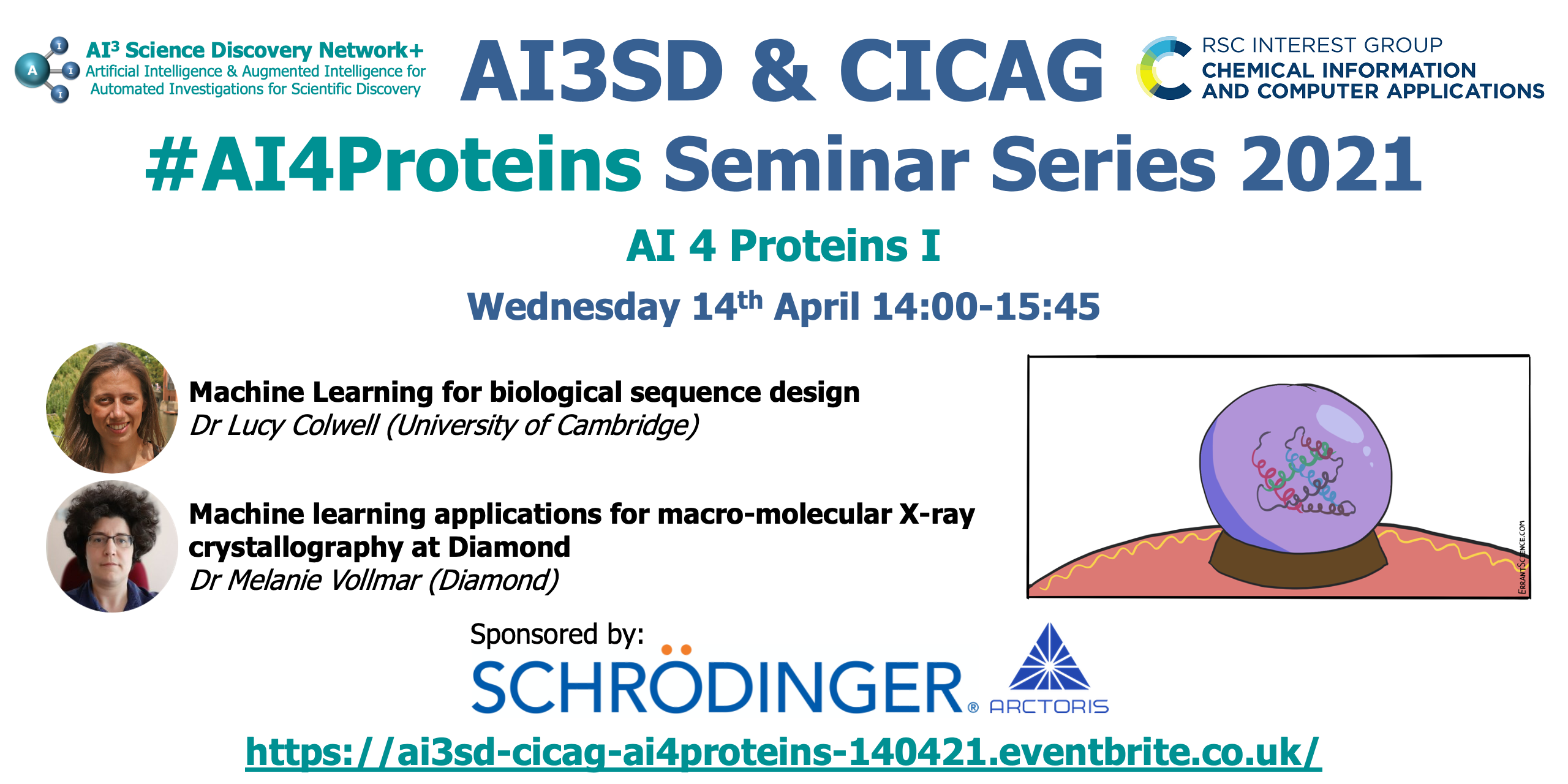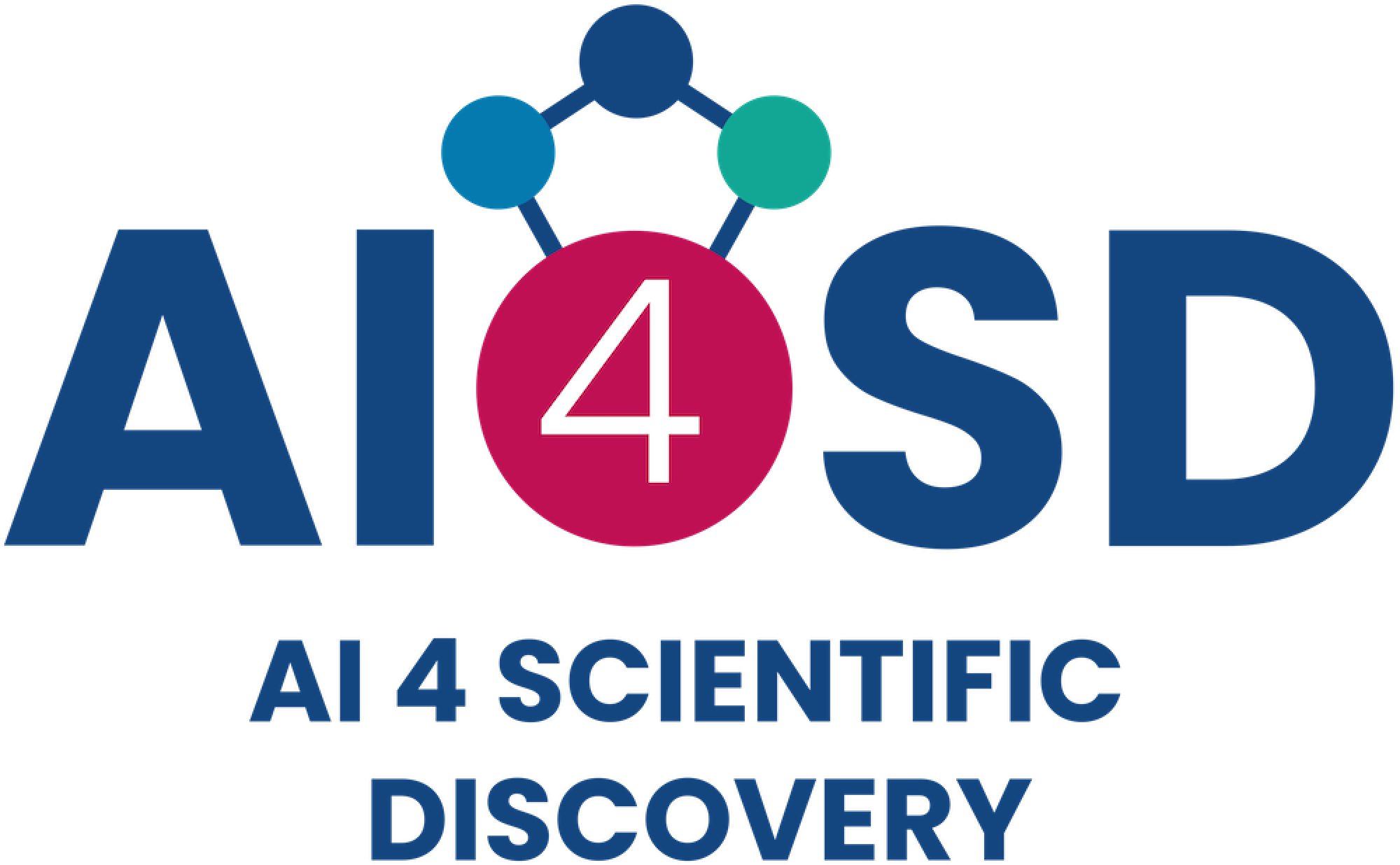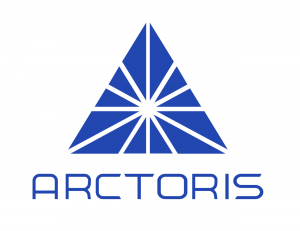
- This event has passed.
14/04/2021 – AI3SD Winter Seminar Series: AI 4 Proteins
14th April 2021 @ 2:00 pm - 3:45 pm
Free
Eventbrite Link: https://ai3sd-cicag-ai4proteins-140421.eventbrite.co.uk/
Description:
This seminar forms part of the AI3SD Winter Seminar Series and is also the first in the AI3SD and RSC-CICAG AI 4 Proteins Series. This seminar will be run via zoom, when you register on Eventbrite you will receive a zoom registration email alongside your standard Eventbrite registration email. Where speakers have given permission to be recorded, their talks will be made available on our AI3SD YouTube Channel. The theme for this seminar is AI 4 Proteins.
Agenda
- 14:00-14:45: Machine learning for biological sequence design – Dr Lucy Colwell (University of Cambridge)
- 14:45-15:00: Coffee Break
- 15:00-15:45: Machine learning applications for macro-molecular X-ray crystallography at Diamond – Dr Melanie Vollmar (Diamond)
Abstracts & Speaker Bios
- Machine learning for biological sequence design – Dr Lucy Colwell: Prediction of protein functional properties from sequence is a central challenge that would allow us to discover new proteins with specific functionality. Experimental breakthroughs allow data on the relationship between sequence and function to be rapidly acquired that can be used to train and validate machine learning models that predict protein function directly from sequence. However, the cost and latency of wet-lab experiments require methods that find good sequences in few experimental rounds, where each round contains large batches of sequence designs. In this setting, I will discuss model-based optimization approaches that allow us to take advantage of sample inefficient methods and find diverse optimal sequence candidates for experimental evaluation. The potential of this approach is illustrated through the design and experimental validation of viable AAV capsid protein variants for gene therapy applications.
Bio: Lucy Colwell is a faculty member in chemistry at the University of Cambridge. Her primary interests are in the application of machine learning approaches to better understand the relationship between the sequence and function of biological macromolecules. With collaborators Lucy showed that graphical models built from aligned protein sequences can be used to predict protein tertiary structure and functional attributes. Before moving to Cambridge Lucy received her PhD from Harvard University and was a member at the Institute for Advanced Study in Princeton, NJ. In 2018 Lucy was appointed a Simons Investigator in Mathematical Modeling of Living Systems. - Machine learning applications for macro-molecular X-ray crystallography at Diamond – Dr Melanie Vollmar: Proteins are the core machinery in any living organism. Understanding their structure means understanding their function and the mechanism with which they carry out this function. In many diseases, the structure of a protein is altered through amino acid exchange usually as a result of mutations in the encoding DNA. The changes in the structure in turn alter the functions and mechanisms in proteins. Being able to understand these changes on an atomic level, offers the opportunity to design drugs to manipulate, regulate and control these proteins with the aim to reduce or even eliminate the effects they cause on an organism. X-ray crystallography, besides cryo-EM and NMR, is one of the methods with which a protein’s structure can be revealed to atomic level. Synchrotron facilities such as Diamond have made great investments over the last decade to push for automation and high-throughput. On the other hand, the large data amounts produced as a result, require a new thinking of how to automate data analysis in turn. As a proof-of-principal work, a machine learning (ML) based decision maker has been implemented into the automated data analysis pipelines at Diamond. The aim is, to explore ML based applications for decision making in the data analysis process to change the current threshold-based, brute-force system to one that offers more flexibility. This in turn will reduce the number of executed jobs but does not diminish the success rate and makes more efficient use of the limited, shared compute resources.
Bio: Melanie Vollmar is a postdoctoral researcher within the macromolecular X-ray (MX) crystallography village at Diamond Light Source, the UK’s national synchrotron. Her work focuses on using the vast amounts of user data produced at the facility to develop machine learning-based decision-making tools for application in the automated data analysis pipelines. Melanie has a background in structural biology looking at membrane proteins during her PhD at the University of Düsseldorf, Germany, and working in a high-throughput environment at the Structural Genomics Consortium (SGC) at the University of Oxford.

